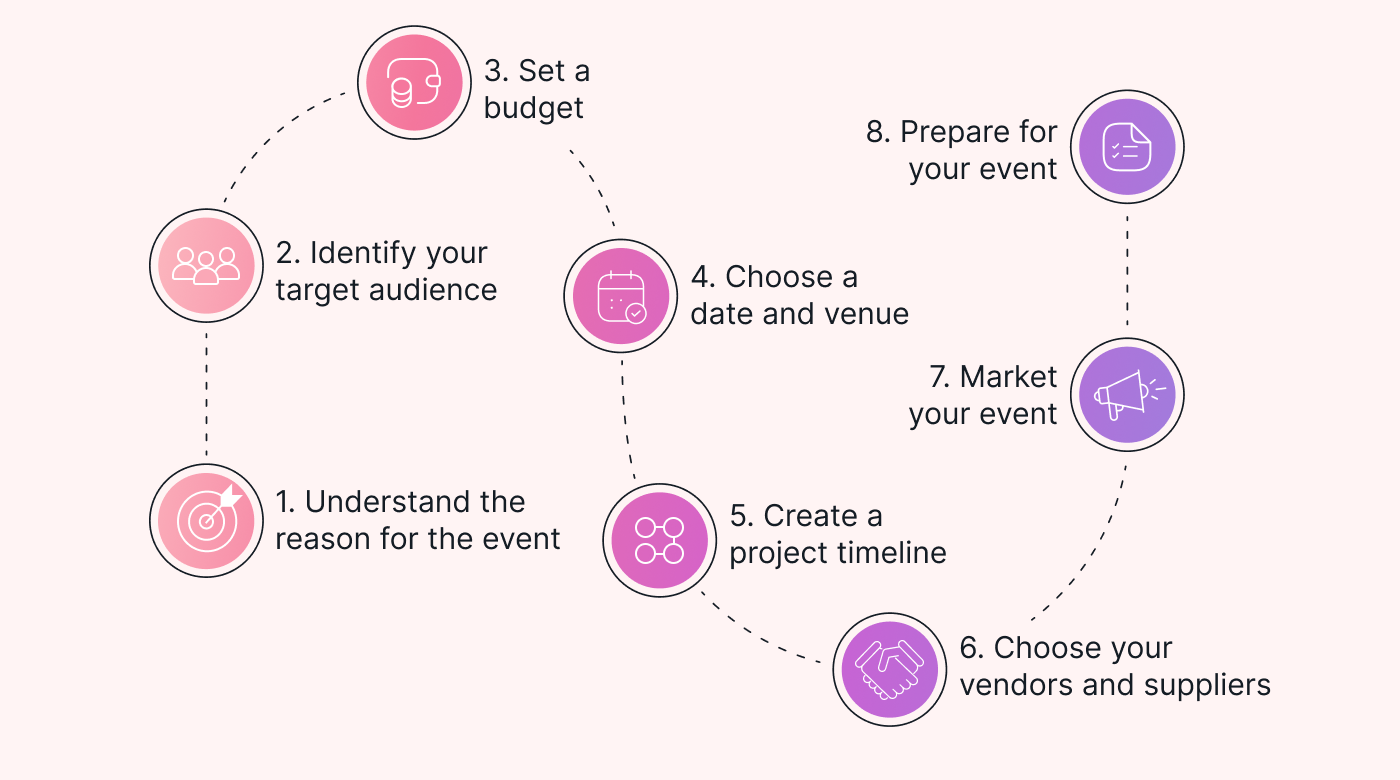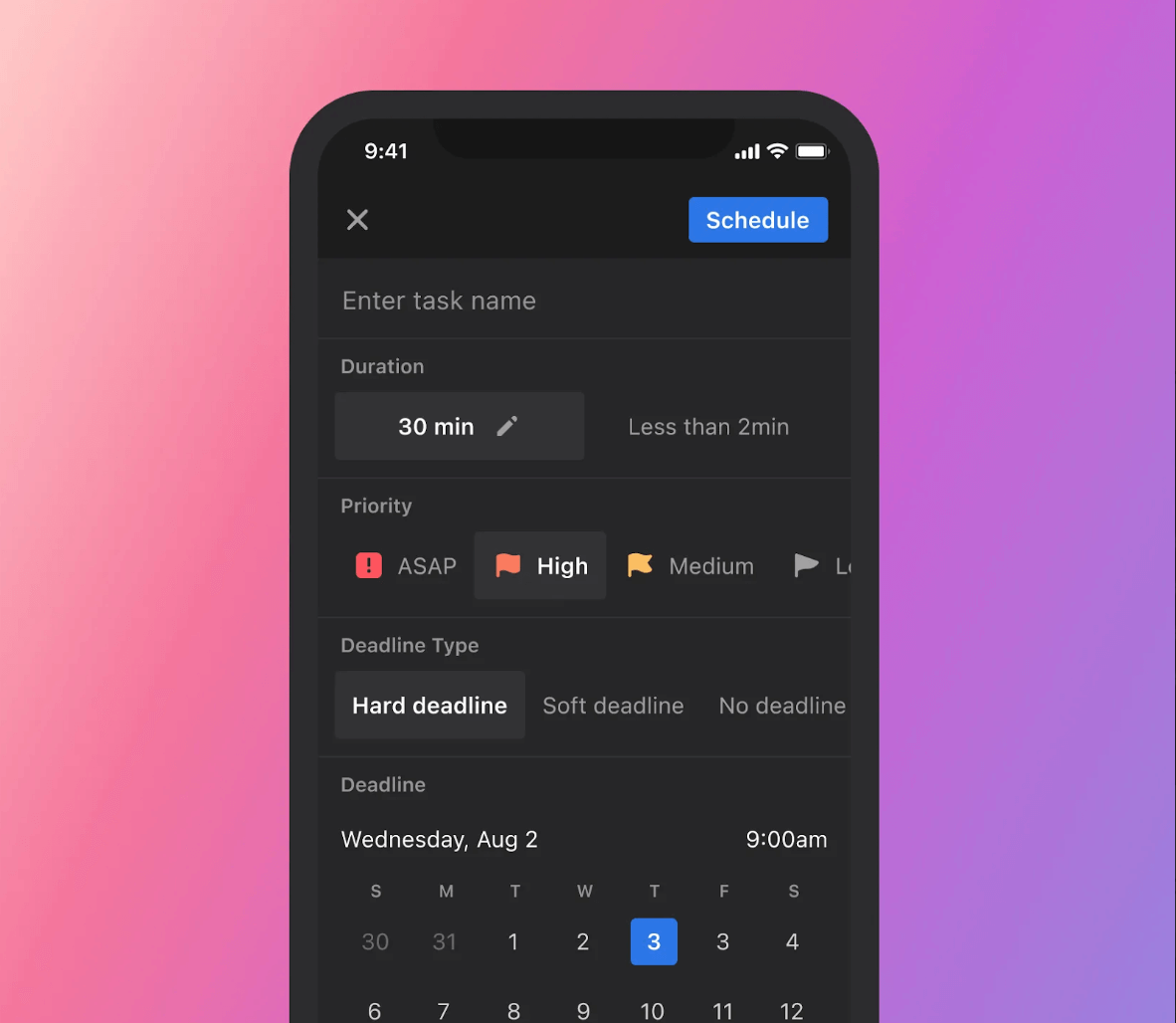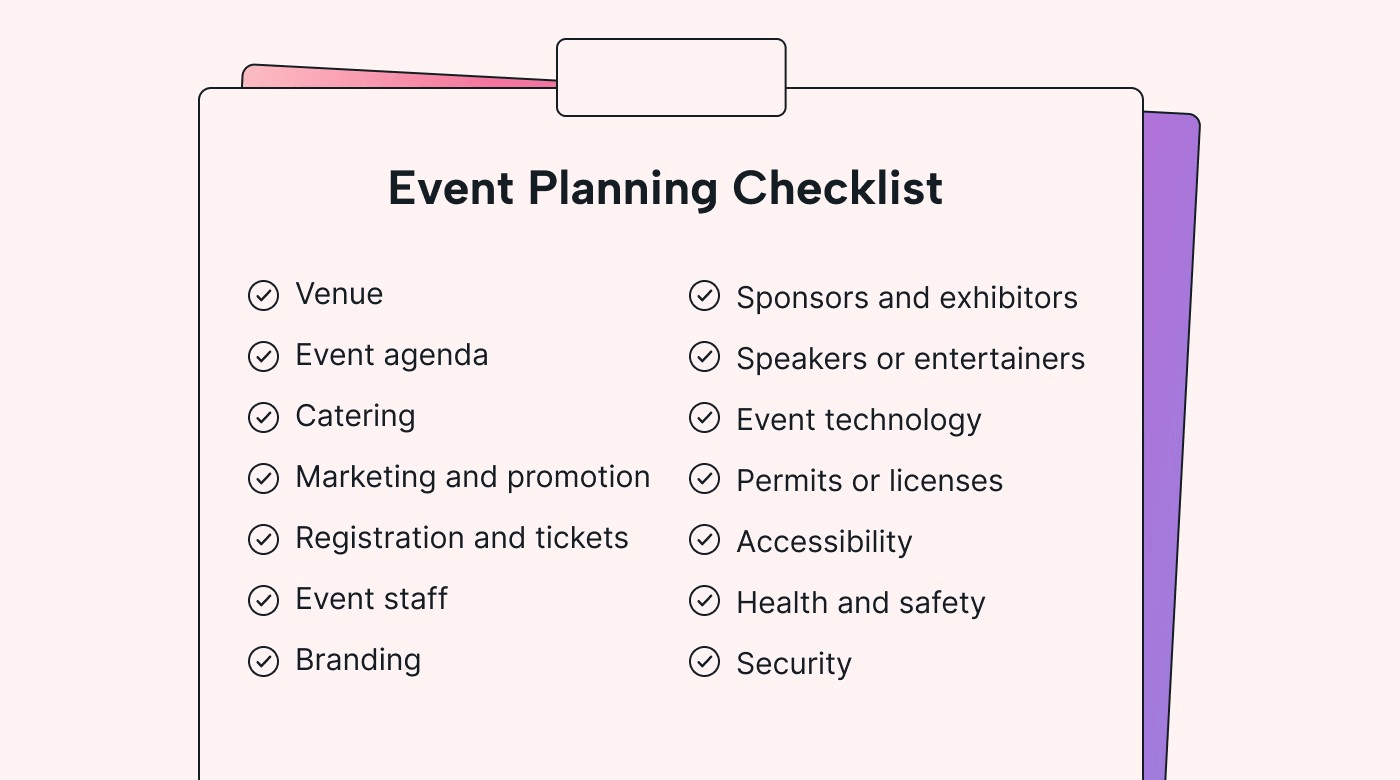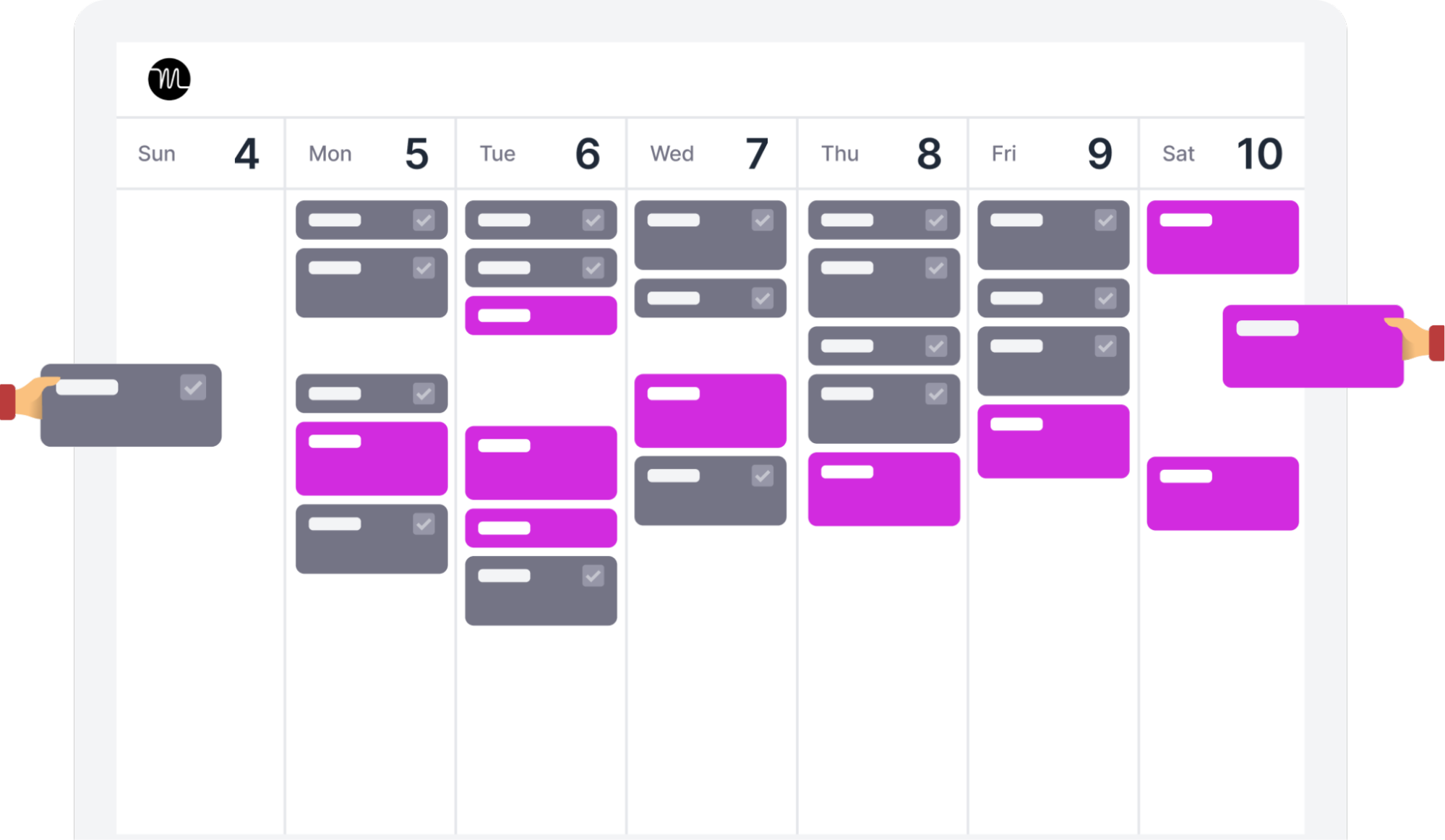Have you ever attended a business event that left you feeling inspired, motivated, or simply amazed?
That’s the magic of event planning — the art of creating experiences that bring people together, spark enthusiasm, and drive business growth. Whether it’s a product launch or a conference, business event planning is about transforming a vision into a successful reality.
But planning a successful event can be daunting. From picking a venue and caterer to sending out invitations, there’s a lot to tick off on an event planning to-do list. This article will give you a step-by-step guide — including a checklist — to event planning so you can pull off your event like a pro.
What is event planning?
Event planning involves organizing and coordinating all aspects of an event, whether it’s a wedding, conference, or business gathering. The main objective is to create an exceptional experience for attendees while achieving the event’s goals.
In the business context, event planning includes organizing events like trade shows, product launches, and conferences. These events play a significant role in driving brand awareness, generating leads, and establishing industry credibility. Because of these benefits, 71% of marketers have begun experimenting with new event formats.
What does an event planner do?
Some people make a living out of event planning. Event planners manage various tasks throughout the event-planning process. They work closely with clients to understand the latter’s event objectives, target audience, and desired outcomes while ensuring a smooth execution that leaves a lasting impression on the attendees.
 |
For example, an event planner organizing a corporate conference would be responsible for the following tasks:
- Securing a suitable venue
- Managing registrations and ticketing
- Coordinating the audiovisual equipment
- Arranging catering and accommodations
- Designing the event program
- Overseeing the logistical operations
How to plan an event: a step-by-step guide
The steps and tasks involved in planning an event will depend on the type of event you’re planning and how big it is. However, following the general steps below can help you stay organized and ensure that your event succeeds.
 |
1. Understand the reason for the event
Begin by clearly defining the purpose of your event and the specific objectives you want to achieve. You need to know what you want from the event. For instance, do you want to make new business contacts, establish industry authority, or generate leads? These goals will guide the whole planning process.
But it’s about more than just hitting those goals. The event also has to fit with the company’s or client’s bigger aims. That’s why working closely with clients or people invested in the event is important. Really getting to know what these individuals need and like can help planners make an event that’s not just successful but is also remembered and talked about long afterward.
2. Identify your target audience
Thoroughly research your target audience, including their demographics, professional backgrounds, and interests. Understand their pain points, needs, and desires to tailor your event to their expectations.
Consider demographics, professional backgrounds, and pain points. How old are the attendees, and what do they like? What are they hoping to see at the event? These questions will help you design a program and select relevant speakers and topics that resonate with your audience.
3. Set a budget
Establish a realistic budget that aligns with the goals and objectives of your event. Consider expenses such as venue rental, catering, speaker fees, marketing materials, technology, and event staffing. Allocate resources strategically to maximize the impact of your event within the required budget.
4. Choose a date and venue
Choose a date that will minimize conflict with other industry events or major holidays. Consider the seasonality and weather conditions that might affect attendance and logistical requirements. Choose a venue that reflects the tone and image you want to convey and provides the necessary facilities to accommodate your audience comfortably.
5. Create a project timeline
Develop a detailed project timeline that outlines all the necessary tasks and deadlines leading up to the event. Include milestones for securing vendors, finalizing the program, designing marketing materials, and managing logistics. Use a project management tool like Motion to streamline collaboration and ensure timely event execution.
6. Choose your vendors and suppliers
Research and select vendors and suppliers who specialize in professional business events and can deliver high-quality services. This may include caterers, florists, audiovisual technicians, event planners, or other professionals who can contribute to the success of your event. Collaborate closely with them to align their services with your event objectives.
7. Market your event
Craft a comprehensive marketing strategy to promote your event effectively. Use various channels, like email marketing, social media, industry publications, and targeted advertising, to reach your desired audience. Highlight the unique value proposition of your event and its relevance to your target attendees, compelling them to register and attend.
8. Prepare for the event
Ensuring you have everything you need for the event is important for a smooth experience. This means you need all the right equipment, like speakers, screens, signs, and systems for registering people. It’s also a good idea to do a few rehearsals or run-throughs to catch any problems before the big day.
 |
A great tool to help you keep your finger on the pulse of your event is Motion’s mobile app. It lets you stay updated no matter where you are in the event-planning journey.
Event-planning checklist
When organizing a professional event, paying attention to every detail ensures a seamless and impactful experience for your attendees. The following checklist covers key aspects of the event-planning process:
 |
Guestlist
Create a comprehensive guestlist by identifying your target audience and inviting individuals who align with your event objectives. Consider professional backgrounds, interests, and whether there are any VIP attendees you may want to accommodate.
Venue
Choose a venue that reflects the tone and image you want to convey. Consider factors such as capacity, location, amenities, and the overall atmosphere to ensure that they align with your event goals.
Seating plan
Design a seating plan that facilitates networking and maximizes engagement among attendees. Consider factors such as the event format, session requirements, and any special seating needs for guests.
Catering
Choose a reputable catering service that can accommodate diverse dietary requirements and preferences. Ensure that the menu aligns with your event’s overall theme or concept.
Invitations
Craft compelling invitations with key event details, including date, time, venue, and RSVP information. Consider using personalized messaging and branding to create a sense of anticipation among the recipients.
Theme or concept
Develop a cohesive theme or concept that resonates with your event objectives and target audience. Ensure that all elements, including décor, signage, and promotional materials align with the chosen theme.
Music and entertainment
Select appropriate music and entertainment that complement your event’s ambiance and desired atmosphere. Consider live performances, DJs, or background music that enhances the overall experience.
Backup plan
Prepare a contingency plan for unforeseen circumstances, such as inclement weather. Ensure you have backup options for outdoor activities, including an alternative indoor space if needed.
Permits or licenses
Check local regulations and obtain any permits or licenses required for your event, such as alcohol permits, music licenses, or event-specific permissions.
Accessibility
Ensure your event venue and facilities are accessible to all attendees, including individuals with disabilities. Consider wheelchair access and accessible restrooms.
Security
Implement appropriate security measures to ensure the safety of attendees and protect valuable assets. Arrange for trained security personnel or coordinate with professional security services, if necessary.
First aid
Have a designated first aid area and trained personnel available to provide immediate assistance, if necessary.
Event planning tips
Here are some tips to help you plan and execute a successful event:
Start planning early
Give yourself plenty of time to plan and organize the event, especially if it’s large or complex. Don’t leave everything to the last minute.
Professional event planners prefer to begin planning a new event 18 months in advance and a preexisting event 8 to 12 months in advance. These timelines provide the least amount of stress on planners and clients.
Pay attention to details
It’s the small things that make an event amazing. Ensure that every event detail, from the seating arrangements to the lighting, is carefully planned and executed.
Consider event planning trends
The business event landscape is constantly changing. To stay current and keep your events exciting, stay in the know of the latest trends in event planning.
One trend that has gained significant traction in recent years is using virtual reality (VR) at corporate events. VR has the potential to transform events by offering improved engagement, immersive experiences, and realistic simulations. For example, using VR at a trade show helps you showcase products and services engagingly and interactively — making a lasting impression on potential clients.
 |
Big companies, like Facebook (now Meta), Apple, Microsoft, and Google, are also investing heavily in the metaverse for events. This VR universe offers immersive experiences, with two types of metaverse experiences particularly gaining traction in the trade show and conference industry: augmented show-floor experiences and remote 3D experiences for virtual attendees.
Communicate effectively
Ensure that all stakeholders, including vendors, suppliers, and attendees, are kept informed about the event and any changes to the plan.
Be flexible and adaptable
Be prepared to adjust your plan as needed and have a contingency plan in case of unexpected issues or challenges.
Assess the event’s success
Gather feedback from attendees and stakeholders of the event, and use it to identify areas for improvement for future events.
Take care of yourself
Event planning can be stressful, so take care of yourself and your team members. Be mindful of your team’s mental health, and celebrate your successes throughout the event-planning process.
Motion is every event planner’s best friend
As an event planner, you have the power to pull off incredible events for your business. Whether you’re looking to grow your business’s image or start new partnerships, this rewarding field is about leveraging the opportunity to foster business growth.
But in this high-stakes environment, you need to have the right resources at your disposal.
Motion’s intuitive platform harnesses the power of automation and AI to help you plan events. Here are some of its features:
Schedule meetings and appointments
Time management is paramount in the world of event planning. With Motion, you can effortlessly schedule meetings with clients, vendors, and team members.
 |
No more endless back-and-forth or double bookings — Motion streamlines this process, freeing up more time on your calendar so you can focus on other aspects of the event.
Manage tasks and projects
Juggling multiple tasks and projects is the norm in event planning. With Motion, you can manage tasks effectively and stay ahead of deadlines since the software automatically constructs your schedule and calendar based on your to-do list.
And the beauty of Motion doesn’t stop there. It also intelligently re-prioritizes tasks when unforeseen issues arise, or tasks take longer than expected, ensuring that you never drop the ball.
Collaborate with team members
Planning an event is a team effort. Motion For Teams enables seamless collaboration by allowing you to assign tasks and monitor your team members’ progress. The ability to see everyone’s schedules will help your team stay in sync — enhancing their productivity and ensuring a cohesive approach to planning the event.
Manage your time
In the event-planning industry, time is of the essence.
Motion helps you manage your time more effectively, ensuring you stay on track throughout the planning process. With its smart scheduling and task management features, you’ll accomplish more in less time, delivering top-notch events without burning out.
Leverage the power of Motion and elevate your event-planning process. Sign up today for a 7-day free trial and experience the difference for yourself.





